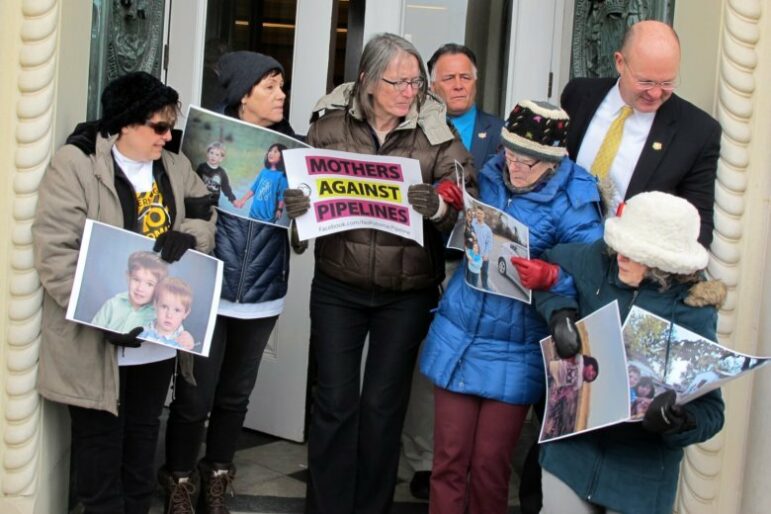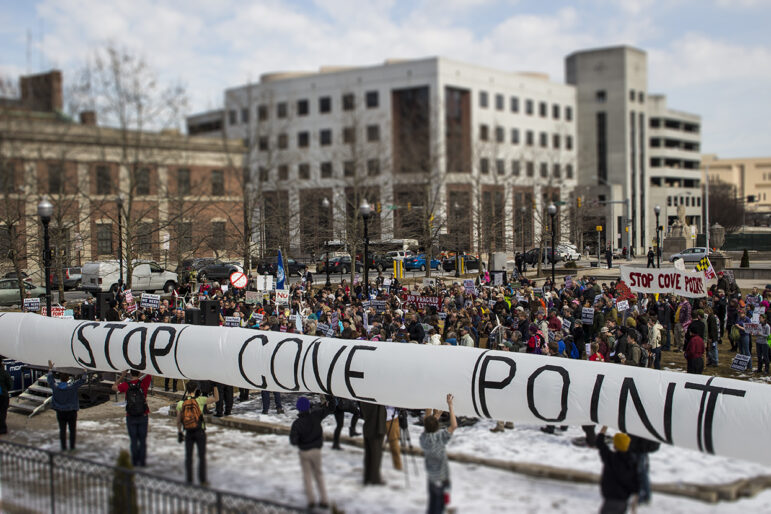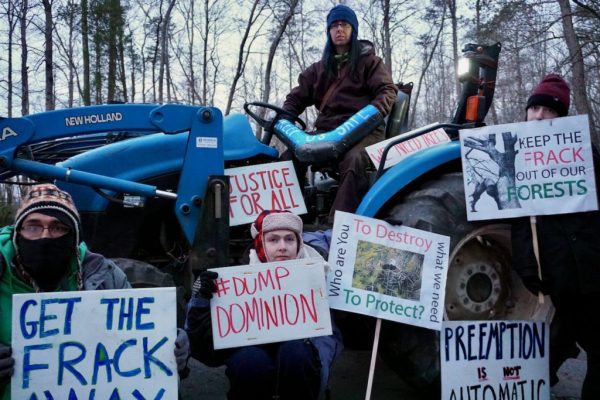Enough is enough: Maryland is being overrun by proposed fracked-gas infrastructure and other looming dirty energy proposals in the state.
Despite rapidly intensifying climate change, Maryland is being overrun with proposed dirty energy infrastructure that will endanger clean water and frontline communities while making climate change worse. Right now, multiple pipelines and compressor stations for fracked-gas are being proposed. Already, the state has seen the construction of a massive liquefied natural gas export facility at Cove Point in Southern Maryland. Enough is enough. It is time to oppose new fossil fuels in Maryland.
Marylanders have now launched a “No New Fossil Fuels” declaration to draw a badly needed line in the sand.
Here’s the problem: every time a new fracked-gas pipeline or liquefied natural gas facility or dirty compressor station is proposed, progressive groups and vulnerable landowners are routinely caught off guard.
The goal of the NNFF pledge is to take the clear OFFENSIVE step in laying down a marker that maintains a clear battle line from the start and makes it easier for all elected officials to understand that any new dirty energy project will be totally rejected by our groups from day one.
In 2017, Maryland became the first state with gas reserves to legislatively ban fracking. This was a result of activists across the state working like never before to protect their communities and our climate.
Unfortunately, frontline communities are still under attack, with fracked-gas pipelines, compressor stations, and power plants being proposed all across the state. That’s why we launched our “No New Fossil Fuels” declaration.
What we're facing -- and who's fighting it
All across the state, there is fracked-gas infrastructure coming online. And all across the state, there are grassroots groups fighting to protect their communities. From pipelines to storage facilities to power plants to export terminals, the fights are many. Here’s a snapshot at some of them, along with the groups fighting back:
The communities of rural Western Maryland and West Virginia are faced with a fracked-gas pipeline that would run underneath the Potomac River and endanger the drinking water source of over 6 million people. In January 2019, then-Governor Hogan and the Maryland Board of Public Works voted unanimously to reject a right-of-way easement for the project. But the fight is not over. The companies behind the pipeline could still sue and try to build. Read more about it here: Stop the Pipeline under the Potomac.
There’s a new pipeline project coming to Maryland, and Maryland ratepayers are on the hook for it. Two proposed pipelines would connect to bring fracked gas from Delaware into Maryland down the Eastern Shore, threatening the region’s ecosystems and drinking water supplies, and causing irreparable damage to the land and our climate. Learn more here: No Eastern Shore Pipeline.
For 43 straight weeks, residents from Cove Point gathered in Annapolis to plead for a safety study around the Cove Point LNG facility — the first liquefied fracked gas export terminal on the East Coast and the first one in the world in such a densely populated area. Unfortunately, this natural gas export terminal began operating in January 2018, which has led to a surge of natural gas in the state. Stay updated here: We Are Cove Point.
In Charles County, residents fought to stop a Dominion compressor station — and won! To build it, Dominion had planned to lower the water table by 16 feet, endangering nearby wetlands and drinking water wells. It’s likely that Dominion will propose another compressor station elsewhere, but for now, the community is safe. Learn more with We Are Cove Point and the AMP Creeks Council.
The C.P. Crane facility was a coal-fired electric generation power plant located within the tidal Gunpowder River in Baltimore County, Maryland. CP Crane’s coal-fired power plant was removed from service in June 2018 when it was deemed unnecessary for electricity in the region. Despite the conclusion that this facility is not needed to meet our region’s electricity demands, there are plans to convert it into a highly polluting gas peaker plant. We are currently working to deny the permit necessary for this conversion. Read more here.
Brandywine, MD a 72% black front-line community is host to three fossil fuel power plants in a 2.9-mile radius in operation withfive in a 13-mile radius. This is a clear example of environmental racism. Learn more: STOP Additional Brandywine MD Power Plants Facebook page, BTB Coalition, and Clean Air Prince George’s.
See here for a running list of natural gas infrastructure threats to Maryland. If you know of a project not on this list, please email jamie@chesapeakeclimate.org.



Legislative Solutions:
Solution #1: Institute a PSC Climate Test
The Maryland Public Service Commission (PSC) regulates electricity and gas supply in the state. It approves facilities that generate electricity and oversees the gas industry. When it approved a former coal plant repowering to gas, the PSC stated that its governing statute “does not specifically or generally require considerations regarding climate change.” The PSC staff agreed: “the Commission has never required that any consideration of climate change and its effects be included in a . . . proceeding.”
Similarly, in testimony submitted to the Senate Finance Committee in 2020, the PSC stated that “the Commission is not mandated to make decisions about labor standards.” It is important that the PSC keep labor standards and equity front and center. We need a PSC that is able to fully consider these proposals’ climate change and labor impacts.
That’s why our sister organization, CCAN Action Fund, helped pass the “Consideration of Climate and Labor Act” in 2021! This legislation is great first step to ensuring that future infrastructure projects will not continue to adversely affect Marylanders and their environment.
The bill will direct the PSC to consider climate change in its regulation of the electricity sector, based upon the best available scientific information recognized by the IPCC and achieving our state climate goals, when reviewing applications and approving sites for new facilities. Read more here.
Solution #2: Make Polluters Pay
When carbon is burned, it releases harmful carbon dioxide emissions. By burning fossil fuels, Maryland is running up a moral debt. That debt is coming due in the form of rising sea levels, increasing intensity of ravaging storms, and pollution-inflicted health disparities. Meanwhile, fossil fuel CEOs exploited Maryland for their own profit. While our health has been bankrupted, their wealth has only grown. It is time to make Maryland whole by reversing that imbalance.
By using existing tax mechanisms to implement a fee on the carbon content of fuels, polluters are incentivized to reduce their use of carbon, effectively reducing the amount of CO2 in the environment. Currently, there is no market accountability for fossil fuel companies who continue to increase their use of carbon without a fee in place. The enormous consequences of CO2 on the health of individuals, especially in already overburdened communities, cannot continue to go unregulated. It is essential that polluters pay a price for their environmental impact and transition to less toxic fuels.
It is time for environmental, grassroots, faith, labor and civil rights leaders to come together to say that we must protect our communities, our future, and our climate. That is why we our launching our No New Fossil Fuels Campaign. By joining together, we will let polluters and our elected leaders know that communities across the state will stand up to dirty fossil fuels and stand up for a future that protects our health.
Enough is enough. The science is clear. There can be no new fossil fuel development. No more pipelines. No more exploration of fossil fuels. We need a just transition to the clean energy economy now.
Organizational sign-ons:
- Cedar Lane Unitarian Universalists, Chesapeake Climate Action Network, Chesapeake Physicians for Social Responsibility, Episcopal Diocese of MD, Food and Water Watch Maryland, Greenbelt Climate Action Network, Harford County Climate Action, Howard County Climate Action, Interfaith Power & Light, Maryland Environmental Health Network, Maryland League of Conservation Voters, Maryland State Conference of NAACP, Montgomery County Climate Mobilization, Sierra Club Maryland Chapter, Waterkeepers Chesapeake. See the list here.
Key articles:
- “FERC: No rehearing on Potomac pipeline.” Herald-Mail, 3/27/20
- “FERC Approves Eastern Shore Natural Gas Company Expansion.” Cision, 1/7/20
- “Maryland seeks dismissal of federal lawsuit by company blocked from building natural gas pipeline.” Baltimore Sun. 6/18/19
- “Keep your pipelines out of Maryland.” Washington Post. 6/7/19
- “Dozens rally to continue pipeline fight in Maryland.” Herald Mail Media. 5/30/19
- “Larry Hogan, reluctant environmentalist.” The Baltimore Sun Opinion. 1/7/19
- “Hogan votes against ‘Potomac Pipeline’ following years of opposition from activists.” The Washington Post. 1/2/19
- “Opponents of gas pipeline under Potomac River seek legislation to stop it.” Herald-Mail Media. 3/29/18
- “Environmental groups ask for rehearing on Columbia pipeline permit.” Morgan Messenger. 8/29/18
- “Advocacy group argues to intervene in Dominion compressor lawsuit.” Maryland Independent. 8/1/18
- “Another health risk heads for Charles County.” The Washington Post. 5/4/18
- “Tractor Blockade Shuts Down Clear-Cutting at Dominion Gas Compressor Site.” DC Media Group. 3/12/18
- “Across from Washington’s estate, a fight between natural gas and a historic view.” Washington Post. 6/27/18
- “The argument for fracking as a climate solution just went down in flames.” ThinkProgress. 6/25/18
- “Compressor stations are a new flashpoint in the debate over natural gas extraction.” Public Radio International. 8/14/16
- “Dangerous Neighbors: Pipelines, Compressor Stations, and Environmental Injustice.” Clean Water for North Carolina. 6/8/16
- Maryland Matters Op-Ed: On Climate, U.N. Says ‘Delay Means Death.’ Do Pepco and BGE Care in Maryland?
- As Ukraine War Pushes Up Gas Prices, Top Maryland Environmental Leaders Challenge Legislators to Pass Strong “Climate Solutions Now Act of 2022”
Resources:
- Factsheet: Healthy Homes: Gas vs Electric
- Read more about Hogan’s fracked-gas expansion plans here
- Factsheet: The Pipeline and Water Protection Act
- A Declaration of No New Fossil Fuels in Maryland
- Organizational sign-ons: No New Fossil Fuels in Maryland
- “The Natural Gas Gamble: A Risky Bet on America’s Clean Energy Future.” Union of Concerned Scientists, 2015
- “Environmental Impacts of Natural Gas.” Union of Concerned Scientists
- Comments on MDE’s proposed methane rules

